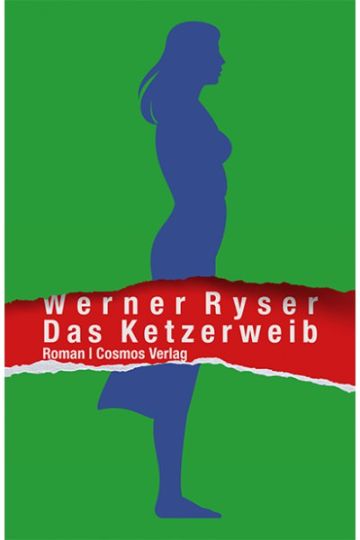Main board: Das Ketzerweib - The Heretic Woman
Was it still nighttime? Confused, she stared into the gloom that surrounded her. Then it came back to her. Ueli, if he was still alive at all, languished in chains on a galley on the wide sea and she was not lying in the wide marriage bed but in the dungeon at Trachselwald Castle. She could not suppress a moan. With the memory of her arrest, the pain that flooded her back also made itself known again. The sound that had woken her up came from the iron flap that opened a hatch in the door. A hand could be seen placing a pitcher and a small loaf of bread in the opening. "Take, drink and eat," said an indifferent female voice. "Bread and water is all that heretics receive for the first seven days in the Murderer's 'Chäschtli'."
Werner Ryser
More information:

Das Ketzerweib, book jacket by Stefan Bundi, Cosmos Verlag 2017.
"Das Ketzerweib" gives a true-to-life account of the life of Anna Jacob in the Emmental region of Bern and describes the historical setting with precision and detail. Life at the beginning of the 17th century was hard, people had narrow limits. Ueli Jacob, Anna's husband, belongs to the Anabaptist movement. Because of his faith, the authorities arrest him and sentence him to galley punishment for life. Only thanks to the help of a neighboring farmer, whose resentment of "those up there" stems from the peasant uprising, can Anna and her family survive. Abused by the local priest, Anna Jacob subtly begins to oppose the preacher and the gracious lords.
Anna is captured by the persecutors of the Anabaptists in 1693 and brought to Trachselwald Castle.[1]
An unfamiliar sound made her jump up. In vain, her arm searched for Ueli, on whose chest she had fallen asleep. No early morning light penetrated into her room as usual. Was it still nighttime? Confused, she stared into the gloom that surrounded her. Then it came back to her. Ueli, if he was still alive at all, languished in chains on a galley on the wide sea and she was not lying in the wide marriage bed but in the dungeon at Trachselwald Castle. She could not suppress a moan. With the memory of her arrest, the pain that flooded her back also made itself known again.
The sound that had woken her up came from the iron flap that opened a hatch in the door. A hand could be seen placing a pitcher and a small loaf of bread in the opening. "Take, drink and eat," said an indifferent female voice.
"Bread and water is all that heretics receive for the first seven days in the Murderer's 'Chäschtli'." The Murderer's 'Chäschtli'. The word weighed on her soul. In the valley, the narrow dungeons of Trachselwald Castle, where criminals awaited the day of their execution, were known as murderer’s boxes. But she had not killed anyone, had not harmed anyone. She was here because, just like her husband, she belonged to the Anabaptist community.
The woman who had brought her bread and water was Beth Wüthrich, the wife of the beadle who had beaten her up and dragged her here. Beth and Balz Wüthrich were despised in the valley. Nobody wanted to have anything to do with them. They had sold out to the authorities. Their trade was considered dishonest. And now she, Anna Jacob, was at the mercy of the two. For better or worse..[2]
[1] Franz Osswald: Die Reformation frisst ihre Kinder, in: reformiert. Juli 2017.
[2] Werner Ryser, Das Ketzerweib, Cosmos Verlag 2017, p.35



